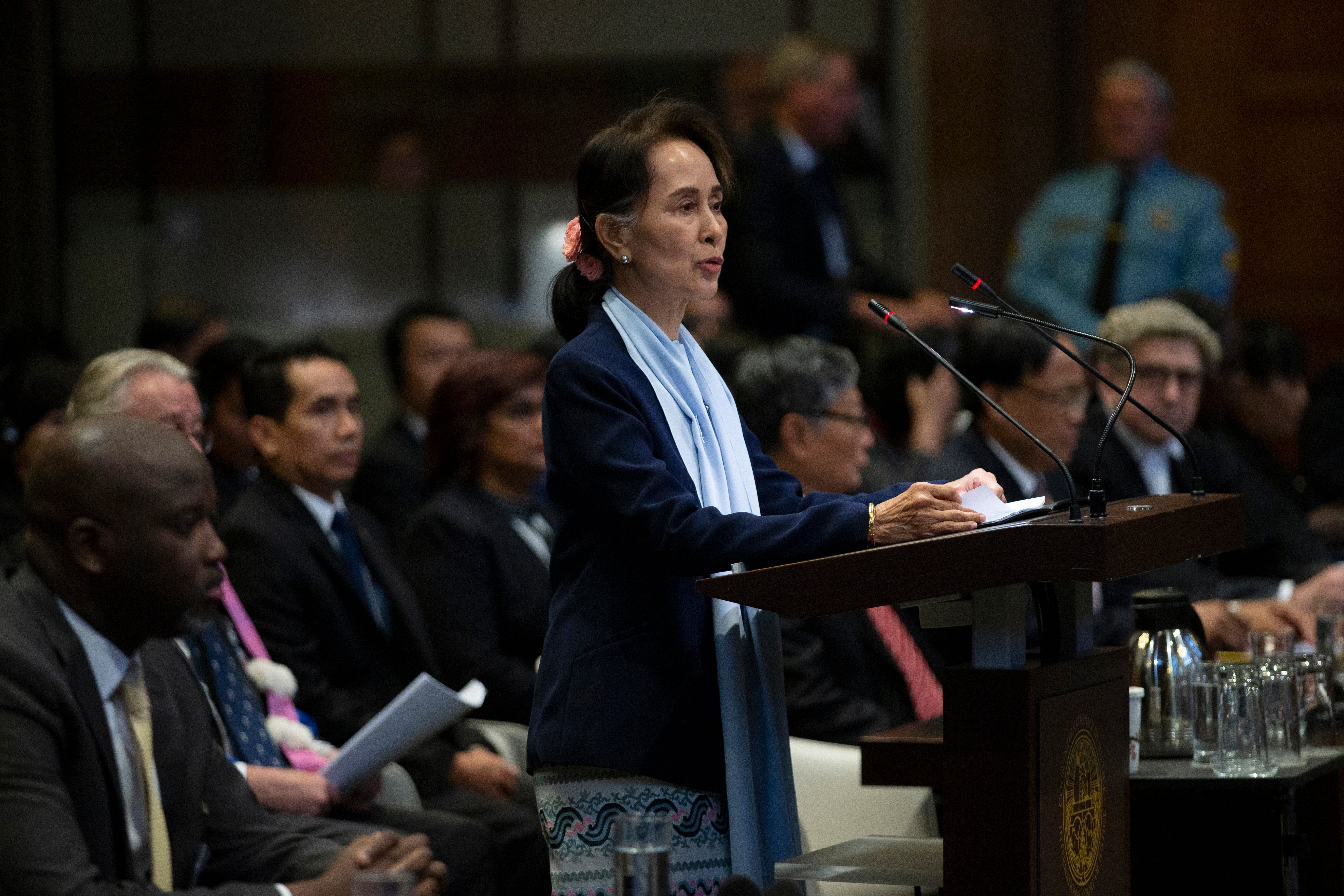Myanmar coup: Aung San Suu Kyi charged by army over ‘walkie-talkies and handshakes’
Police say radios found during search of leader’s home

Your support helps us to tell the story
From reproductive rights to climate change to Big Tech, The Independent is on the ground when the story is developing. Whether it's investigating the financials of Elon Musk's pro-Trump PAC or producing our latest documentary, 'The A Word', which shines a light on the American women fighting for reproductive rights, we know how important it is to parse out the facts from the messaging.
At such a critical moment in US history, we need reporters on the ground. Your donation allows us to keep sending journalists to speak to both sides of the story.
The Independent is trusted by Americans across the entire political spectrum. And unlike many other quality news outlets, we choose not to lock Americans out of our reporting and analysis with paywalls. We believe quality journalism should be available to everyone, paid for by those who can afford it.
Your support makes all the difference.Myanmar’s leader Aung San Suu Kyi and the country’s ousted president have been charged by the military with minor offences relating to some walkie-talkies allegedly imported without the proper licence and for shaking hands during the pandemic, according to a police document.
Ms Suu Kyi was arrested on Monday as the armed forces rounded up political leaders and seized control of the country, complaining of voter fraud in the recent general election. The document said Ms Suu Kyi would be detained for a further two weeks while the charges were investigated.
The actions of the military have been widely condemned by the international community, with the UN calling it a major setback for the progress of democracy in Myanmar and the G7 nations urging generals to “restore power to the democratically-elected government [and] release all those unjustly detained”.
But China, which hasn’t criticised the coup so far, has blocked the UN Security Council from formally condemning it.
The police document issued on Wednesday claimed that during a search of Ms Suu Kyi’s residence, military officers found hand-held radios that were imported illegally and used without permission.
President Win Myint, who was arrested and removed from office by the military on Monday, would also be charged with offences under the natural disaster management law, according to the police document, after he, his wife and his daughter took part in a September campaign event that saw him shaking hands with many attendees, allegedly in breach of Covid regulations.
On Tuesday, the Myanmar army chief General Min Aung Hlaing, who is now in control of the country, announced plans to investigate alleged fraud in the November elections, while also pledging to prioritise tackling the Covid-19 outbreak and handling the economy, reported Myanmar’s state-run Global New Light of Myanmar newspaper.
He said that a new election commission "would examine the voting data to find correct results, and actions would be taken accordingly in the process”. They also plan to scrutinise the voter lists against family household registrations. The military disbanded the previous election commission after it said there was no evidence of widespread fraud in the election.
In November’s vote, the military-backed Union Solidarity and Development Party took just 33 seats compared to Ms Suu Kyi’s National League for Democracy, which won 396 out of the 476 available.
Min Aung Hlaing emphasised that Covid-19 measures taken by Ms Suu Kyi’s government would be continued. So far, Myanmar has recorded over 140,000 cases of coronavirus including 3,100 deaths. The general said he is also looking at measures to boost the economy, especially the agricultural sector which involves 70 per cent of the population.
But according to eye-witness reports from Myanmar on Wednesday, those on the front line of the fight against Covid-19 in the country were also leading the non-violent resistance against the coup, with health staff including doctors either stopping work in protest or wearing red ribbons.
A statement by the newly formed Myanmar Civil Disobedience Movement said that doctors at 70 hospitals and medical departments in 30 cities joined the protest, while it accused the army of putting its interests above those of the people during a pandemic.
Myo Myo Mon, 40, who was among the doctors who stopped work to protest, said: “We really cannot accept this. We will do this in a sustainable way, we will do it in a non-violent way ... This is the route our state counsellor desires,” referring to Ms Suu Kyi.
The civil disobedience campaign is receiving support from student and youth groups as well. Videos posted online showed residents of Yangon shouting anti-coup slogans and banging on pots, pans or anything else they could get their hands on in demonstration.
Yangon resident San Tint said: “It is a Myanmar tradition to drive away evil or bad karma by beating tin or metal buckets.”
According to the NLD, Ms Suu Kyi had called on the public to reject the coup. Some users on Facebook have changed their profile pictures to images of Ms Suu Kyi to show solidarity, while others vowed to boycott products from firms linked to the military.
The protest movement could face an uphill struggle, however, as the military establishment on Tuesday warned against any acts that could cause rioting or instability. Correspondents said that despite the online posts of dissent, the armed forces appeared to have a firm grip on the country.
Additional reporting by agencies




Join our commenting forum
Join thought-provoking conversations, follow other Independent readers and see their replies
Comments